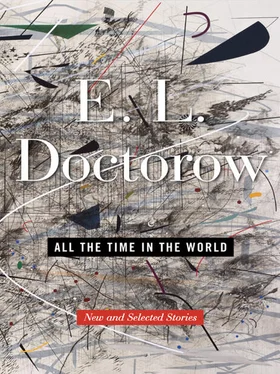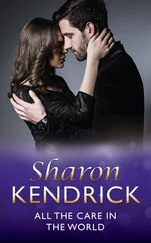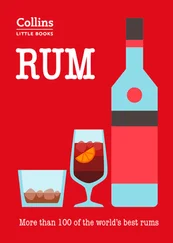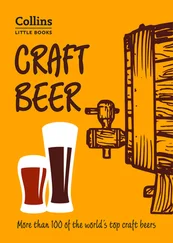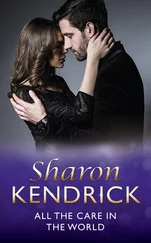She cannot get out of there fast enough. In the street she breaks into a run. She runs until the old people’s home is out of sight.
It is very cold, but the sun shines. She decides to walk up to the mansion at the top of the highest hill in town. The hill streets turn abruptly back on themselves like a series of chutes. She wears lace-up boots and jeans. She climbs through snowdrifts in which she sinks up to the thighs.
The old mansion sits in the sun above the tree line. It is said that one of the factory owners built it for his bride, and that shortly after taking possession he killed her with a shotgun. The Greek columns have great chunks missing and she sees chicken wire exposed under the plaster. The portico is hung with icicles, and snow is backed against the house. There is no front door. She goes in. The light of the sun and a fall of snow fill the entrance hall and its grand stairway. She can see the sky through the collapsed ceiling and a crater in the roof. She moves carefully and goes to the door of what must have been the dining room. She opens it. It smells of rot. There is a rustle and a hissing sound and she sees several pairs of eyes constellated in the dark. She opens the door wider. Many cats are backed into a corner of the room. They growl at her and twitch their tails.
She goes out and walks around to the back, an open field white in the sun. There is a pitted aluminum straight ladder leaning against a windowsill in the second floor. She climbs the ladder. The window is punched out and she climbs through the frame and stands in a light and airy bedroom. A hemisphere of ice hangs from the ceiling. It looks like the bottom of the moon. She stands at the window and sees at the edge of the field a man in an orange jacket and red hat. She wonders if he can see her from this distance. He raises a rifle to his shoulder and a moment later she hears an odd smack as if someone has hit the siding of the house with an open palm. She does not move. The hunter lowers his rifle and steps back into the woods at the edge of the field.
THAT EVENING the young teacher calls the town physician to ask for something to take. What seems to be the trouble? the doctor says. She conceives of a self-deprecating answer, sounding confident and assertive, even managing a small laugh. He says he will call the druggist and prescribe Valiums, two-milligram so that she won’t be made drowsy by them. She walks down to Main Street, where the druggist opens his door and without turning on the store light leads her to the prescription counter in the rear. The druggist puts his hand into a large jar and comes up with a handful of tablets, and feeds the Valium one by one, from his thumb and forefinger, into a vial.
She goes to the movie theater on Main Street and pays her admission. The theater bears the same name as the town. She sits in the dark and swallows a handful of tabs. She cannot discern the picture. The screen is white. Then what she sees forming on the white screen is the town in its blanket of snow, the clapboard houses on the hill, the frozen river, the wind blowing snow along the streets. She sees the children coming out of their doors with their schoolbooks and walking down their steps to the street. She sees her life exactly as it is outside the movie theater.
Later she walks through the downtown. The only thing open is the State News. Several men stand thumbing the magazines. She turns down Mechanic Street and walks past the tool-and-die company and crosses the railroad tracks to the bridge. She begins to run. In the middle of the bridge the wind is a force and she feels it wants to press her through the railing into the river. She runs bent over, feeling as if she is pushing through something, as if it is only giving way to her by tearing.
Across the bridge the road turns sharply left and at the curve, at the foot of a hill of pine trees, is a brown house with a neon sign in the window: THE RAPIDS. She climbs up the porch steps into the Rapids, and looking neither left nor right, walks to the back, where she finds the ladies’ room. When she comes out she sits in one of the varnished plywood booths and stares at the table. After a while a man in an apron comes over and she orders a beer. Only then does she look up. The light is dim. A couple of elderly men are at the bar. But alone down at the end, established with his glass and a pack of cigarettes, is the new bus driver with the long blond hair, and he is smiling at her.
HE HAS JOINED HER. For a while nothing is said. He raises his arm and turns in his seat to look toward the bar. He turns his head to look back at her. You want another, he says. She shakes her head no but doesn’t say thank you. She digs in her coat pocket and puts a wrinkled dollar beside her bottle. He holds up one finger.
You from around here? he says.
From the eastern part of the state, she says.
I’m from Valdese, he says. Down on Sixteen.
Oh, yes.
I know you’re their teacher, he says. I’m their driver.
He wears a wool shirt and a denim jacket and jeans. It is what he wears in his bus. He would not own a coat. There is something on a chain around his neck but it is hidden under the shirt. Blond beard stubble lies sparsely on his chin and along the line of his jaw. His cheeks are smooth. He is smiling. One of his front teeth is chipped.
What do you do to get to be a teacher?
You go to college. She sighs: What do you do to be a driver?
It’s a county job, he says. You need a chauffeur’s license and a clean record.
What is a dirty record?
Why, if you been arrested, you know? If you have any kind of record. Or if you got a bad service discharge.
She waits.
I had a teacher once in the third grade, he says. I believe she was the most beautiful woman I have ever seen. I believe now she was no more’n a girl. Like you. But she was very proud and she had a way of tossing her head and walking that made me wish to be a better student.
She laughs.
He picks up her beer bottle and feigns reproach and holds up his arm to the bartender and signals for two.
It is very easy, she says, to make them fall in love with you. Boys or girls, it’s very easy.
And to herself she admits that she tries to do it, to make them love her, she takes on a grace she doesn’t really have at any other time. She moves like a dancer, she touches them and brushes against them. She is outgoing and shows no terror, and the mystery of her is created in their regard.
Do you have sisters? she says.
Two. How’d you know that?
They’re older than you?
One older, one younger.
What do they do?
Work in the office of the lumber mill down there.
She says: I would trust a man who had sisters.
He tilts his head back and takes a long pull at his beer bottle, and she watches his Adam’s apple rise and fall, and the sparse blond stubble on his throat move like reeds lying on the water.
Later they come out of the Rapids and he leads her to his pickup. He is rather short. She climbs in and notices his work-boots when he comes up into the cab from the other side. They’re clean good boots, new yellow leather. He has trouble starting the engine.
What are you doing here at night if you live in Valdese? she says.
Waiting for you. He laughs and the engine turns over.
They drive slowly across the bridge, and across the tracks. Following her instructions, he goes to the end of the main street and turns up into the hills and brings her to her house. He pulls up in the yard by the side door.
It is a small house and it looks dark and cold. He switches off the engine and the headlights and leans across her lap and presses the button of the glove compartment. He says: Happens I got me some party wine right here. He removes a flat bottle in a brown bag and slams the door, and as he moves back, his arm brushes her thigh.
Читать дальше
